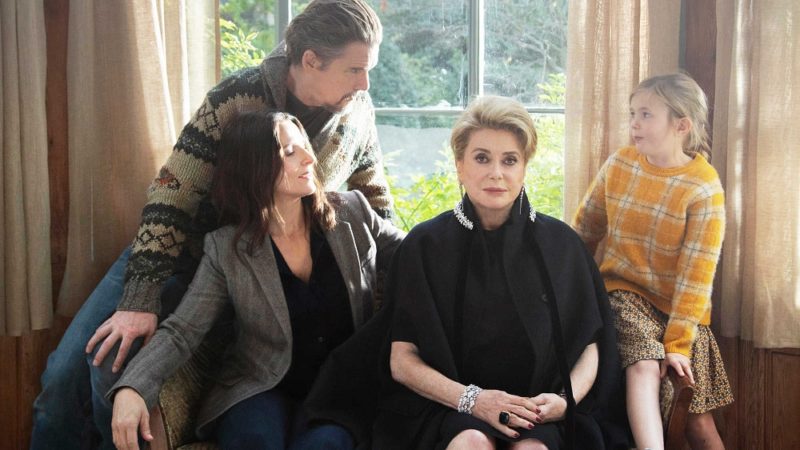The annual bounty from the New Zealand International Film Festival contained some recurring themes. This year’s offering followed overseas trends of going online because of cinema closures during the Covid-19 pandemic.
However, New Zealand’s cinemas are now open, and a small selection of entries hit the big screen. Habits gained through the lockdown appear to be enduring, as audience numbers remain well below pre-Covid times.
The one festival screening I attended was not full, even though it had seating for only a dozen or so. So, the gamble to charge $10 or $12 a time for home viewing would have paid off. Also, the choice was available throughout the country, overcoming the disadvantage of living in places where cinemas are scarce.
The downside of NZIFF20 was the lack of big-name features. But the low cost of choosing from dozens of relatively unknown works made taking a risk worthwhile.
None of the dozen I viewed would make it into a top 10 list in any previous year. But several were standouts.
Two featured mother-daughter relationships in vastly different settings. From France, The Truth (La Verité) (Palace Films) featured two of its top actresses, Catherine Deneuve and Juliet Binoche, in a show-biz linked story.
This contrasted with the Australian-made Relic (Umbrella), a horror film with two equally strong leads, Robyn Nevin and Emily Mortimer. Coincidentally, both films feature bright granddaughters to give a three-generational dimension.
In the former, Deneuve has published a memoir that purports to tell the truth about her life. Her screenwriter daughter (Binoche) knows differently, and has flown from the United States with her actor-husband (Ethan Hawke) and their precocious child (Clémentine Grenier) for the book launch.
The conflict over reality and fabrication is played out in a rural estate on the outskirts of Paris and at the Epinay Studios, where Deneuve is in a film. She is giving her director and a young up-and-coming actress (Manon Clavel) a hard time, as they play the same woman at differing stages in her life.
Japanese director Hirokazu Kore-ada (Shoplifters) uses this plot device to draw out his characters without need for melodrama.
Relic takes a different route, as Nevin is in an advanced state of dementia, but will not leave her rambling mansion, which plays a key part in her madness. She resists attempts to force her out by Mortimer and her adult daughter (Bella Heathcote). Like all good horror movies, the scary stuff is best left to the imagination, making this an impressive debut by director Natalie Erika James.
The recurring theme in Corpus Christi (Palace Films), from Polish director Jan Komasa, and Scott Teems’ The Quarry (Rialto), is the impersonation of the lead character. The respective fake priest and preacher follow similar paths to redemption, as they connect with their unknowing congregations. A review of The Quarry is in the Clips column, while Corpus Christi and other festival highlights will have to wait until they are in wider release.
Ratings: The Truth – parental guidance advised. 107 minutes. Relic – mature audiences. 89 minutes.
CLIPS
23 Walks
(Rialto)
Dog walking has strict rules about etiquette and conversation topics. But when exceptions happen, surprises can happen. That is the premise when German Shepherd owner Dave Johns (I, Daniel Blake) meets Alison Steadman (Gavin & Stacey) and her Yorkshire terrier. Both have good reasons to hold back secrets, as their non-dog relationship deepens during their convivial outings in parks outside London. Initially, they don’t look suited to each other. But each has a motive to do so, as Johns faces expulsion from his social housing and Steadman is dealing with the downsides of divorce. Writer-director Paul Morrison, in his first film in 10 years, doesn’t allow any slackness in dialogue, which keeps the relationship moving as the two well-cast leads adapt to their changing circumstances. A bonus is Steadman singing the 1940s Mexican song “Bésame Mucho”.
Rating: Mature audiences. 102 minutes.
This Town
(Madman)
Unlike the disciplined structure of 23 Walks, this unwieldy Kiwi comedy has the virtues and faults of giving everything a go in the hope something works. The plot is about a suspected mass murderer in a rural backwater, where a disgraced cop is keen to dispense justice, whatever the cost. Laboured references are made to the Bain and Thomas cases, though much effort in the physical surroundings and interiors suggest it could be Hicksville, America or Australia. New Zealanders are, by now, familiar with movies that depict their rural cousins as unsophisticated and good only for breaking the rules. This hasn’t stopped audiences from lapping up a style of comedy that appeals as much to some as it repels others. Co-writer and director Dave White plays the lead role, backed up by Robyn Malcolm, Rima Te Wiata and Alice May Connolly. Look out for Gabe McDonnell as the gossip magazine editor.
Rating: Mature audiences. 91 minutes.
The Quarry
(Rialto)
As mentioned in the main article, this moody Texas-set thriller turns an opportunistic killer into a preacher at an Hispanic church near the border with Mexico. A highway has cut the town off the grid, though it has a police force of three, led by Michael Shannon. The real preacher’s body is found, and some innocent drug-dealing suspects are rounded up. Meanwhile, the fake preacher (Shea Whigam, Joker), who cannot speak Spanish, is packing them in with his no-judgement teachings of redemption. The story is based on a South African novel by Damon Galgut, which is set near the end of the apartheid era. The themes of racial tension and immigration are comfortably transposed, while Shannon brings much-needed credibility to a plot that evolves at the glacial pace. Colombian-born Catalina Sandino Moreno (of TV’s The Affair) is largely wasted in a minor role as the preacher’s translator and a romantic interest for Shannon.
Rating: TBA. 98 minutes.

Reader Interactions